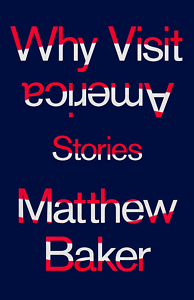Faithful to the Fantastical
Matthew Baker toys with storytelling conventions in Why Visit America
Matthew Baker’s new story collection gets in our face and announces itself immediately. The first complete sentence in the first story, “Fighting Words,” recounts lewd rants of a ninth-grade boy who, with impunity, is terrorizing the narrator’s niece. Soon we learn that the girl and her brother have lost their mom to a new heartthrob, and they’re being raised by the narrator and his brother, sad-sack products of a prior broken home. One man is a “professor of dead languages,” twice divorced; the other, who defines fake words for a dictionary publisher, lusts only for “some nameless, indescribable thing” and has “never loved another human.” They resolve not so much to protect the girl as to avenge her.
 This story sets the tone for the dozen that follow: profoundly alienated characters, fierce conflicts, settings that are at least slightly surreal or futuristic. The alienation doesn’t necessarily drive the action, but it’s always there, looming. And it’s often sexual in some way.
This story sets the tone for the dozen that follow: profoundly alienated characters, fierce conflicts, settings that are at least slightly surreal or futuristic. The alienation doesn’t necessarily drive the action, but it’s always there, looming. And it’s often sexual in some way.
In the second story, for example, a friendless, loverless old man balks at family planning guidelines that call on him to commit suicide. The third story centers on a young man preparing to shed his body and put his digitized mind online. Sex, he says, is “more trouble than it’s worth.” In the fourth story, an ex-convict whose memories have been erased copulates with a wife he no longer knows. And in the fifth, the last men on Earth live in captivity — “menageries” — but remain available to women like the unnamed protagonist:
Her straight friends preferred to have sex with robots because having sex with men was so much more expensive, but she didn’t mind paying extra. Technically the money was a donation. All of the proceeds went toward buying the men special treats, like sorbet and pastries. She liked feeling generous.
 While ever faithful to the fantastical in Why Visit America, Baker nonetheless tries out several genres and sometimes cross-breeds them. After a coming-of-age yarn takes a fairly conventional path, a satire of corporate capitalism sports a satanic twist. Then come tales of horror and erotica with mystical overtones. Near the back of the book, the title story is a hybrid unlike any I’ve seen before. It reads like a mashup of a tour guide’s spiel, a libertarian manifesto, and a Wild West movie script, with a bit of comic book sensibility sprinkled on top.
While ever faithful to the fantastical in Why Visit America, Baker nonetheless tries out several genres and sometimes cross-breeds them. After a coming-of-age yarn takes a fairly conventional path, a satire of corporate capitalism sports a satanic twist. Then come tales of horror and erotica with mystical overtones. Near the back of the book, the title story is a hybrid unlike any I’ve seen before. It reads like a mashup of a tour guide’s spiel, a libertarian manifesto, and a Wild West movie script, with a bit of comic book sensibility sprinkled on top.
The author dares to play with other conventions, too. Most startling, perhaps, are the two times he kills off central characters. In one case, this leaves us with no individual frame of reference for the conclusion; in the other, we begin seeing through brand-new eyes 4 pages before the end of a 44-page piece.
Literary journals previously published many of these stories, helping put Baker on Hollywood’s radar before Holt rolled out the book. Big-name producers have now bought rights to nine of Why Visit America’s component parts, and Baker is writing the film adaptations for two of them. Variety magazine, a go-to source for onscreen entertainment news, has Baker on its inaugural “10 Storytellers to Watch” list. Not bad for a young man who just earned his creative writing M.F.A. from Vanderbilt in 2012. Fame and fortune may well lie ahead for him, given the tremendous growth of scripted TV.
That growth has involved numerous non-realistic shows — which have contributed to the rising popularity of speculative fiction in print, says Baker’s editor, Kerry Cullen. Holt’s bid to capitalize on this with a short story collection is unusual since that form rarely sells well. But Cullen sees inspiration in the Emmy-winning hit TV series Black Mirror. Its characters and futuristic settings change from one episode to the next: “speculative storytelling in the form of separate vignettes,” as she puts it.

Brooks Egerton co-hosts Sewanee Spoken Word, a twice-monthly celebration of creative writing.


